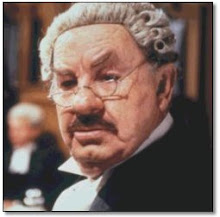The Grisham Suit
 Some things could only happen in Oklahoma. The prosecutor and investigator that were described in John Grisham's "The Innocent Man" have sued Grisham, Doubleday, Barry Schenck, and several others for allegedly conspiring to defame them by writing books and giving speeches about their conduct in the now infamous State v. Williamson and Fritz cases.
Some things could only happen in Oklahoma. The prosecutor and investigator that were described in John Grisham's "The Innocent Man" have sued Grisham, Doubleday, Barry Schenck, and several others for allegedly conspiring to defame them by writing books and giving speeches about their conduct in the now infamous State v. Williamson and Fritz cases.Fritz and Williamson were convicted of first degree murder but later found innocent by means of DNA evidence through the work of the Innocence Project. They came within days of being executed. The experience is alleged to have exacerbated Ron Williamson's mental and physical problems. Williamson died shortly after being exonerated.
For Grisham, Schenck and Doubleday this suit will probably be at best a costly annoyance. However, for the less successful authors and others involved, the lawsuit may silence what could have been the most probing look into the Oklahoma justice system since former Oklahoma Supreme Court Justice William A. Berry's "Justice for Sale" described the 1960's Oklahoma Supreme Court Scandal.
Further complicating the Grisham case is the fact that under Oklahoma ethical
 rules , it can be a very dangerous matter for an attorney to suggest that there may be a problem at the courthouse. I have great respect for Oklahoma Supreme Court Justice Marian Opala who observed:
rules , it can be a very dangerous matter for an attorney to suggest that there may be a problem at the courthouse. I have great respect for Oklahoma Supreme Court Justice Marian Opala who observed:The court’s pronouncement imposes upon a licensed Oklahoma legal practitioner the affirmative duty to stand "four square" for the purity of criminal law enforcement process and to whitewash it even when a doubt may exist. The lawyer is forced affirmatively to assert that all is well with the prosecutorial service; he is free neither to suspect nor to be apprehensive that, in fact, things are not so well. Implicit in the expected affirmations is the disturbing notion that lawyers must serve as enthusiastic cheerleaders for the government. I view § 22 as commanding the government to maintain the very same neutrality that the U.S. Supreme Court has found to be embodied in the First Amendment’s protection of free expression.7Had respondent been vocally denying the possibility of any corruption in the prosecutor’s office, no disciplinary action would likely have followed and this case would not have been called to our attention.
¶4 By counseling the court that respondent’s comments are indeed shielded, I do not mean to condone his failure affirmatively to state that he would not participate in any improper action. What I emphatically and firmly advance is that professional discipline should not be invoked to chill free speech. Today’s opinion places a higher burden on a practitioner than any licensed legal professional may be required to bear in the constitutional order of our free society.
¶5 Lawyers are not government mouthpieces to be programmed for incantation of an absolution mantra that will sanctify officialdom in power.8 The
court’s pronouncement reduces them to the very same status they were forced to endure in the most repressive totalitarian regimes of yesteryear’s Europe. I cannot countenance a decisional [29 P.3d 558] course that turns the Bar into mindless champions for government-dictated orthodoxy.
State ex. rel. Oklahoma Bar Ass'n. v. Erickson, 2001 OK 66
The Grisham suit will go a long way toward clarifying some very troubling questions about what happens when light is introduced into the dark corners of the courthouse. Only time and a Federal Judge in a remote little District in Eastern Oklahoma will tell what the result will be .

0 Comments:
Post a Comment
<< Home